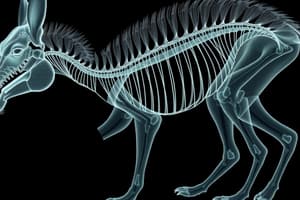Podcast
Questions and Answers
In binomial nomenclature, what does the first word in an animal's scientific name represent?
In binomial nomenclature, what does the first word in an animal's scientific name represent?
- Genus (correct)
- Order
- Class
- Family
What does the second word in the scientific name of an animal indicate?
What does the second word in the scientific name of an animal indicate?
- Order
- Family
- Phylum
- Species (correct)
When dividing individuals of a species into subspecies, what type of nomenclature is used?
When dividing individuals of a species into subspecies, what type of nomenclature is used?
- Uninomial
- Multinomial
- Binomial
- Trinomial (correct)
According to scientific nomenclature rules, where is the generic name placed in relation to the specific name?
According to scientific nomenclature rules, where is the generic name placed in relation to the specific name?
What is the typical style used for formatting a scientific name?
What is the typical style used for formatting a scientific name?
If a species has been transferred to a different genus, how is the original author's name represented?
If a species has been transferred to a different genus, how is the original author's name represented?
What is the primary basis of classification in the practical system?
What is the primary basis of classification in the practical system?
According to Aristotle, how did he divide animals in the artificial classification system?
According to Aristotle, how did he divide animals in the artificial classification system?
What distinguishes the natural system of classification from artificial classification?
What distinguishes the natural system of classification from artificial classification?
What is the primary objective of scientific nomenclature in animal classification?
What is the primary objective of scientific nomenclature in animal classification?
Which scientist devised a system for giving scientific names to organisms?
Which scientist devised a system for giving scientific names to organisms?
What is the key language source for deriving scientific names?
What is the key language source for deriving scientific names?
Flashcards are hidden until you start studying
Study Notes
Binomial Nomenclature
- Binomial nomenclature is a system of naming animals with a two-word name, with the first word indicating the genus (generic name) and the second word indicating the species (specific name)
- Example: Homo sapiens, where Homo is the generic name and sapiens is the specific name
Trinomial Nomenclature
- Trinomial nomenclature is used for subspecies, where the name consists of three words: genus, species, and subspecies
- Example: Homo sapiens europens, where europens is the subspecies
Rules of Scientific Nomenclature
- Scientific names must be binomial for species and trinomial for subspecies
- The generic name is always capitalized and written before the specific name
- The first letter of the specific name is usually in lowercase
- Scientific names should be written in italics or underlined
- The names of divisions above the genus are not written in italics, but start with a capital letter
- The name of the zoologist who first described the species may be included after the scientific name, along with the year of description
Classification Systems
- Practical system: groups animals based on their value to man, without considering their similarities and dissimilarities
- Artificial classification: groups animals based on superficial resemblance to a single character in structure, with some ecological factors
- Natural system: uses all available data, including structure, physiology, embryology, distribution, biochemistry, and other features, to show relationships by descent from simpler organisms
Studying That Suits You
Use AI to generate personalized quizzes and flashcards to suit your learning preferences.




